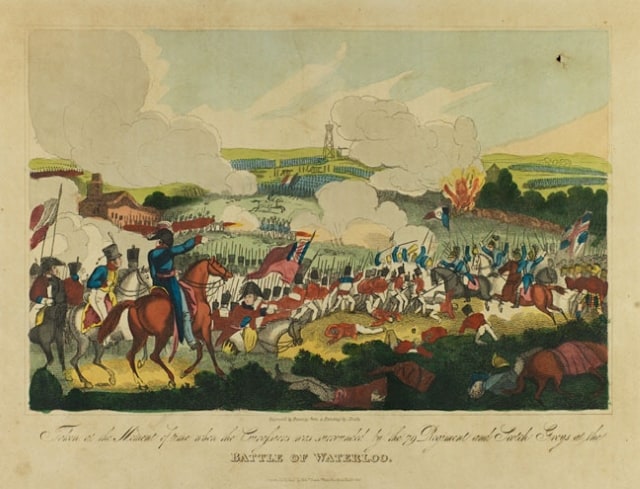Commemorating the bicentenary of Waterloo
Chris Woolgar is the lead educator on the University of Southampton’s free online course, “Wellington and the Battle of Waterloo.” He talks here about the course and the bicentenary of Waterloo in June.

Most of us will have heard of the Battle of Waterloo. 1815 is popularly regarded, alongside 1066, as one of the two memorable dates in British history. But why was it important? What did it change? And what part did the Duke of Wellington play?
To mark the bicentenary of the Battle, we are giving you the opportunity to explore Waterloo and its aftermath from Wellington’s perspective, using his vast archive at the University of Southampton.
Waterloo brought a definitive end to what was a world war in all but name and the peace settled the shape of Europe for much of the next century.
Understanding two decades of conflict
Waterloo was the first occasion on which Wellington and Napoleon had faced each other on the battlefield, yet it came at the end of two decades of conflict across the globe.
We will examine how this struggle came about and why it lasted so long – from its origins in the French Revolution, through the creation of a French empire under Napoleon, to the point where, for Great Britain, this was a war of survival.
Working with coalitions
It was also about working with coalitions. Britain might control the seas, but to win the war, Napoleon had to be defeated on land. Only in alliance with other powers could Britain ensure there were sufficient land-based forces to engage the French across Europe.
Britain’s main contribution – and Wellington’s – was in the Iberian peninsula where, in 1808-14, the Duke was to become Great Britain’s most successful general. We will see it was his success there that convinced other European powers that Napoleon could be defeated.
Escaping from Elba
The escape of Napoleon from Elba at the end of February 1815 opened up a terrible prospect for the allies. For the security of Europe, it was now inevitable that they would have to defeat Napoleon once again.
You can read Napoleon’s rousing speeches and see how his charisma drew the French army back to him. We will see the allies set out the legal basis for war, declaring Napoleon an outlaw – this was personal – and put in the field four massive armies.
Napoleon would not disturb the peace of Europe again.
Arriving at Waterloo
And then we turn to Waterloo itself – why it was fought where it was, and how we can know what happened during the Battle.
One of our themes compares sources from Wellington’s Waterloo Despatch to the memoirs of private soldiers. But defeating Napoleon at Waterloo did not conclude the campaign, and we follow the allied forces into France, and look at the ways in which hostilities were brought to a conclusion and peace established.
If the peace of Versailles, at the end of World War 1, is tainted in many eyes for its consequences, one of the remarkable things about the peace of 1815 is that it is not. One of the reasons is that the allies enabled France to re-establish herself as an international power, and we will examine how that was achieved.
Commemorating the bicentenary of Waterloo
One of our themes is the commemoration of Waterloo and its heroes. Memories of this war are all around us. There can be few towns in Britain that do not have a Duke of Wellington pub, or Waterloo Arms, or memorials or streets named after the occasion.
One of the first course activities will be for you to track down your “local” Wellington or Waterloo site. There will be examples, too, from across the world, particularly in former UK colonies.
The centenary of Waterloo was scarcely marked, given that Britain and France were allies fighting World War 1, yet it was an important occasion for much of the nineteenth century.
Reputations rise and fall: Wellington’s turn to politics in the two decades after Waterloo saw his decline steeply, but by the time of his death in 1852, he was again the nation’s hero – a Great Briton. His state funeral – the first since Nelson and Prime Minister Pitt’s in 1806 – saw a vast outpouring of public grief. There had been nothing quite like it.
To follow the story of Waterloo and Wellington – and comment on and debate the key issues that faced Europe two hundred years ago – join “Wellington and the Battle of Waterloo” now.




